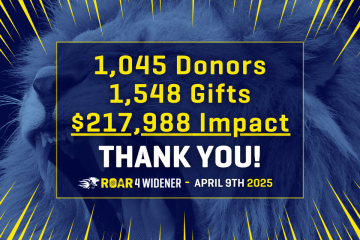Paying it Forward: Alumnus Supports Next Generation of Students

Patton Vo’s college years were not easy.
He arrived at Widener as a nursing major but struggled academically. “Early on I found out nursing was not my jam,” said Patton, who switched to psychology.
Patton was also grappling with his identity and family issues. Just before freshman year, he came out as gay to his traditional Vietnamese parents; the news was not well received.
“It was really hard on the family to accept that and it was a struggle for me,” said Patton, who turned to his Widener family for support, and found it from professors, staff members, and his fraternity brothers in Phi Delta Theta.
“When I was at the lowest point of my life, the only organization and people there for me were people associated with Widener,” said the 2015 graduate. “It’s why I’m so passionate about Widener.”
And when Patton experienced an incident of homophobia on campus, his fraternity brothers and university administrators took swift action to hold people accountable. And through courageous conversations, he actually became friends with those who had wronged him.
Motivated by the financial, academic, and emotional support he received as a student, Patton is now paying it forward as an alumnus, continuing to leave his mark on the university. He’s an active member of the community through his work on the Alumni Council and is spearheading scholarships to support LGBTQ+ students and the next generation of Phi Delta Theta members.
When I was struggling with my own identity, Widener never turned its back against me. And that’s exactly the type of experience I want to provide other students. — Patton Vo ’15
Power of Philanthropy
A first-generation college student, Patton was drawn to Widener because of its emphasis on civic engagement and the generous scholarship he was offered. Early on, he understood the importance of philanthropy and in helping others realize a college education. As a student he interned for Widener’s Development Office, and after graduation pursued a career in higher education fundraising as a way to “truly make an impact and change the lives of students.”
Pride in Support and Inclusivity
Understanding firsthand the power of philanthropy and the support that LGBTQ+ students need, Patton helped start, and serves as lead donor, on Widener’s LGBTQ Pride Endowed Scholarship, a fundraising effort that, once it reaches endowment level, will help support a full-time student who is a member of the LGBTQ+ community. “I’ve realized that there are donors who care about providing access to those who may not have access to higher education. I’m passionate to do this from an equity perspective.”
Since first joining the Widener community, Patton has seen the university make significant strides in fostering a more diverse, equitable, and inclusive community, pointing to the importance of programs like the Common Ground initiative, and SAGA (Sexuality and Gender Alliance) student group.
“It’s so vital to provide a holistic approach to the growth and development of students. Widener is not just talking the talk,” said Patton. “Although there’s definitely room for improvement and growth, we’ve come a long way.”
Giving Back
The camaraderie and support Patton experienced through his fraternity has inspired him to join fellow Phi Delta Theta alumni to create the 511 Fund. Working in partnership with the university, the 511 Fund provides students support to live at the campus Phi Delta Theta fraternity house located at 511 E. 13th St.
Patton and his alumni brothers have set a goal to raise $130,000 and create an endowed fund to annually award support for room and board expenses and minor household enhancements.
Next Step in His Career
Today, Patton has taken his passion for helping others into the corporate sector. He recently began as vice president of field operations for Grapefruit Health, a medical testing and telehealth company focused on improving the quality of life for patients, clients, and the communities they serve. The firm, and Patton, are eying an expansion of services, including public health and infectious disease programs. “We’re closing the gap between education and health care,” he said.
Editor's Note: This story was originally published as part of Widener's Pride Perspectives series. See more from that series on our Widener Advantage site >>


